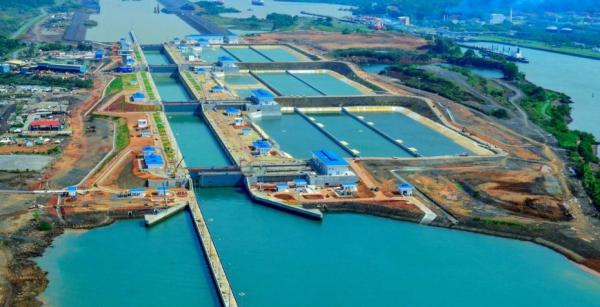International trade rerouted as Panama Canal cuts traffic due to drought
3 Dec 2023 by The Water Diplomat

On the 27th of November the Panama Canal Authority (PCA) launched a programme to auction transits through the canal. The new system will auction the transit three days prior to the route becoming available, and is a response to the strongly reduced availability of water to feed the canal.
From the 3rd of November, the Panama Canal Authority (PCA) implemented additional reductions in the number of vessels travelling through the waterway in an effort to conserve water. This follows the driest October month on record, with recorded rainfall at 41% below average, which experts attribute to the El Niño climate phenomenon. Each time a ship passes through the canal, a large quantity of water is used. In response to the drought, early in the year, the maximum draft (the distance from the bottom of a ship to the water line) was reduced to 15 metres, restricting access to the canal for larger ships. Currently, the maximum draft is 13.4 metres, which is still enough to allow 70% of the ships to traverse the canal. The PCA has reduced the number of ships passing through the canal daily from 40 to 24, and this number is set to decline to 18 if the drought persists.
As a result of the reduced availability of the canal for international shipping, shipping companies are reportedly rerouting their ships through the Suez canal, the Cape of Good Hope and the straits of Magellan. On the 12th of November there were 122 ships waiting for their turn to access the canal
The Panama Canal is a key to international shipping as it enabled ships to travel between the Pacific and Atlantic Oceans without having to travel around South America. 40% of all container traffic of the United States passes through the canal, and the trade through the canal is worth some 270 billion dollars a year. The canal requires large amount of freshwater to operate, which is drawn from Gatun lake, whose levels have been declining steadily since the first measurements in 1965.
